Piano Sheet Music
 "If being an egomaniac means I believe in what I do and in my art or music, then in that respect you can call me that... I believe in what I do, and I'll say it." John Lennon
"If being an egomaniac means I believe in what I do and in my art or music, then in that respect you can call me that... I believe in what I do, and I'll say it." John Lennon
Traditional

Balakirev
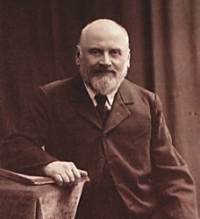
Mily Alexeyevich Balakirev (Russian: Милий Алексеевич Балакирев, Milij Alekseevič Balakirev, 1910) was a Russian pianist, conductor and composer. He is known today primarily for his work promoting musical nationalism in Russia. Working in conjunction with critic Vladimir Stasov, Balakirev brought together the composers now known as the Five, encouraged their efforts and acted as a musical midwife both for them and for Pyotr Ilyich Tchaikovsky.
Balakirev began his career as a pivotal figure in Russian music by extending and developing the fusion began by Mikhail Glinka of traditional Russian and boldly experimental music. In doing so, he established musical patterns that could express overtly nationalistic feeling. He not only demonstrated in his own works how this could be done, but also by taking amateur musicians of prescribed musical education but enormous potential such as Modest Mussorgsky, Alexander Borodin and Nikolai Rimsky-Korsakov, he imparted his own musical beliefs and passed them on to underlie the thinking of his pupils.
Balakirev found himself in an unusual position in his later yers of attending premieres of works he had begun long ago but had only recently completed. For instance, he began writing his First Symphony in 1864 but finished it in 1897. Often, the musical ideas normally associated with Rimsky-Korsakov or Borodin actually originated in Balakirev's compositions. However, his slowness in bringing his works before the public robbed him of credit for his inventiveness. Also, pieces which if completed in the 1860s and 70s would have enjoyed success if they had been performed at that time actually made a much smaller impact when they were introduced toward the end of the composer's life because they had been overtaken by the accomplishments of younger composers. The exception to this is his oriental fantasy Islamey, which is still popular among pianists.
Balakirev began his career as a pivotal figure in Russian music by extending and developing the fusion began by Mikhail Glinka of traditional Russian and boldly experimental music. In doing so, he established musical patterns that could express overtly nationalistic feeling. He not only demonstrated in his own works how this could be done, but also by taking amateur musicians of prescribed musical education but enormous potential such as Modest Mussorgsky, Alexander Borodin and Nikolai Rimsky-Korsakov, he imparted his own musical beliefs and passed them on to underlie the thinking of his pupils.
Balakirev found himself in an unusual position in his later yers of attending premieres of works he had begun long ago but had only recently completed. For instance, he began writing his First Symphony in 1864 but finished it in 1897. Often, the musical ideas normally associated with Rimsky-Korsakov or Borodin actually originated in Balakirev's compositions. However, his slowness in bringing his works before the public robbed him of credit for his inventiveness. Also, pieces which if completed in the 1860s and 70s would have enjoyed success if they had been performed at that time actually made a much smaller impact when they were introduced toward the end of the composer's life because they had been overtaken by the accomplishments of younger composers. The exception to this is his oriental fantasy Islamey, which is still popular among pianists.
Henry Steel Olcott
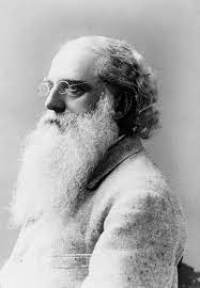
Chauncey Olcott, born John Chancellor Olcott and often spelled Chauncey Alcott, (July 21, 1858 – March 18, 1932) was an American stage actor, songwriter and singer of Irish descent. When the producer Augustus Pitou approached him in 1893 to succeed William J. Scanlan as the leading tenor in sentimental operettas on Irish themes, Olcott accepted and performed pseudo-Irish roles for the remainder of his career.
Ludwig van Beethoven

Ludwig van Beethoven (/ˈlʊdvɪɡ væn ˈbeɪt(h)oʊvən/ (About this soundlisten); German: (About this soundlisten); baptised 17 December 1770 – 26 March 1827) was a German composer and pianist. A crucial figure in the transition between the classical and romantic eras in classical music, he remains one of the most recognized and influential musicians of this period, and is considered to be one of the greatest composers of all time.
Beethoven was born in Bonn, the capital of the Electorate of Cologne, and part of the Holy Roman Empire. He displayed his musical talents at an early age and was vigorously taught by his father Johann van Beethoven, and was later taught by composer and conductor Christian Gottlob Neefe. At age 21, he moved to Vienna and studied composition with Joseph Haydn. Beethoven then gained a reputation as a virtuoso pianist, and was soon courted by Prince Lichnowsky for compositions, which resulted in Opus 1 in 1795.
Beethoven was born in Bonn, the capital of the Electorate of Cologne, and part of the Holy Roman Empire. He displayed his musical talents at an early age and was vigorously taught by his father Johann van Beethoven, and was later taught by composer and conductor Christian Gottlob Neefe. At age 21, he moved to Vienna and studied composition with Joseph Haydn. Beethoven then gained a reputation as a virtuoso pianist, and was soon courted by Prince Lichnowsky for compositions, which resulted in Opus 1 in 1795.
Bill Evans
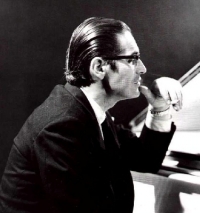
William John Evans, known as Bill Evans (August 16, 1929 – September 15, 1980) was an American jazz pianist. His use of impressionist harmony, inventive interpretation of traditional jazz repertoire, and trademark rhythmically independent, "singing" melodic lines influenced a generation of pianists, including Chick Corea, Herbie Hancock, John Taylor, Steve Kuhn, Don Friedman, Denny Zeitlin, Bobo Stenson and Keith Jarrett, as well as guitarists Lenny Breau and Pat Metheny. The music of Bill Evans continues to inspire younger pianists like Marcin Wasilewski, Fred Hersch, Ray Reach, Bill Charlap, Lyle Mays, Eliane Elias and arguably Brad Mehldau, early in his career.
Evans is an inductee of the Down Beat Jazz Hall of Fame.
Evans is an inductee of the Down Beat Jazz Hall of Fame.
Alexandre Desplat
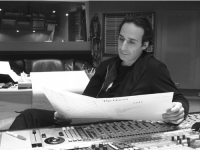
Desplat has extensively composed for films, first in France and later in Hollywood, including scores and incidental music for some 100 films among which are Lapse of Memory and Family Express (both 1992), Regarde Les Hommes Tomber (1994), Les Péchés Mortels (1995), the César nominated Un Héros Très Discret (1996), Une Minute De Silence and Sweet Revenge (both 1998), Le Château Des Singes (1999), Home Sweet Home and Reines D'Un Jour (both 2001), the César nominated Sur Mes Lèvres (2002), and Rire Et Châtiment (2003), among others.
Desplat has composed individual songs that have been sung in films by artists such as Akhenaton, Kate Beckinsale, Charlotte Gainsbourg, Valérie Lemercier, Miosotis, and Catherine Ringer. He has also written music for the theatre, including pieces performed at the Comédie Française. Desplat has conducted performances of his music played by the London Symphony Orchestra, the Royal Philharmonic Orchestra, and the Munich Symphony Orchestra. In addition to his composing and performing, Desplat has also given Master Classes at La Sorbonne in Paris and at London's Royal College of Music.
In 2007 he composed the high profile scores for Philip Pullman's The Golden Compass; Zach Helm's directorial debut Mr. Magorium's Wonder Emporium with American composer Aaron Zigman; and the Ang Lee movie Lust, Caution. Prior to these breakout works, he contributed scores for The Luzhin Defence, Girl with a Pearl Earring, Syriana, Birth, Hostage, Casanova, The Nest and The Painted Veil, for which he won the Golden Globe Award for Best Original Score, Los Angeles Film Critics Association Award for Best Music, and the 2006 World Soundtrack Award. He won the 2007 BMI Film Music Award, 2007 World Soundtrack Award, 2007 European Film Award, and received his first Academy Award nomination for Best Original Score for The Queen. He also won the Silver Berlin Bear at the Berlin Film Festival for Best Film Music in The Beat that My Heart Skipped. In 2008, Desplat received his second Oscar nomination for David Fincher's The Curious Case of Benjamin Button.
Desplat's recent projects include Largo Winch, based on the Belgian comic; Afterwards a French-Canadian psychological thriller film directed by Gilles Bourdos in English; Anne Fontaine's Coco avant Chanel based on the life of designer Coco Chanel; Robert Guédiguian's L'Armée du Crime; Cheri, reuniting him with director Stephen Frears, whom he collaborated with on The Queen; Un Prophète reuniting with director Jacques Audiard; Julie & Julia directed by Nora Ephron; Fantastic Mr. Fox, directed by Wes Anderson and based on the novel by Roald Dahl; and New Moon, directed by Chris Weitz, out in November 2009.
Desplat's upcoming projects are The Tree of Life, directed by Terrence Malick, The Ghost, directed by Roman Polanski, and Largo Winch 2 .
Desplat has composed individual songs that have been sung in films by artists such as Akhenaton, Kate Beckinsale, Charlotte Gainsbourg, Valérie Lemercier, Miosotis, and Catherine Ringer. He has also written music for the theatre, including pieces performed at the Comédie Française. Desplat has conducted performances of his music played by the London Symphony Orchestra, the Royal Philharmonic Orchestra, and the Munich Symphony Orchestra. In addition to his composing and performing, Desplat has also given Master Classes at La Sorbonne in Paris and at London's Royal College of Music.
In 2007 he composed the high profile scores for Philip Pullman's The Golden Compass; Zach Helm's directorial debut Mr. Magorium's Wonder Emporium with American composer Aaron Zigman; and the Ang Lee movie Lust, Caution. Prior to these breakout works, he contributed scores for The Luzhin Defence, Girl with a Pearl Earring, Syriana, Birth, Hostage, Casanova, The Nest and The Painted Veil, for which he won the Golden Globe Award for Best Original Score, Los Angeles Film Critics Association Award for Best Music, and the 2006 World Soundtrack Award. He won the 2007 BMI Film Music Award, 2007 World Soundtrack Award, 2007 European Film Award, and received his first Academy Award nomination for Best Original Score for The Queen. He also won the Silver Berlin Bear at the Berlin Film Festival for Best Film Music in The Beat that My Heart Skipped. In 2008, Desplat received his second Oscar nomination for David Fincher's The Curious Case of Benjamin Button.
Desplat's recent projects include Largo Winch, based on the Belgian comic; Afterwards a French-Canadian psychological thriller film directed by Gilles Bourdos in English; Anne Fontaine's Coco avant Chanel based on the life of designer Coco Chanel; Robert Guédiguian's L'Armée du Crime; Cheri, reuniting him with director Stephen Frears, whom he collaborated with on The Queen; Un Prophète reuniting with director Jacques Audiard; Julie & Julia directed by Nora Ephron; Fantastic Mr. Fox, directed by Wes Anderson and based on the novel by Roald Dahl; and New Moon, directed by Chris Weitz, out in November 2009.
Desplat's upcoming projects are The Tree of Life, directed by Terrence Malick, The Ghost, directed by Roman Polanski, and Largo Winch 2 .
Ken Davis
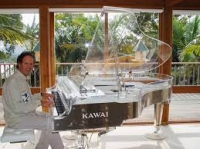
Ken Davis the New Age Musician: Ken Davis cares for our world and life itself. He lives in Sydney Australia where he creates his inspirational instrumental music. His career spans more than thirty years. His first relaxation release was *Feelings From Within* on cassette was in 1982. His music and nature sounds have reached every corner of the world from his live performances at the Sydney Opera House.Ken composes music to heal and harmonize body mind and spirit. The music appeals to peoples minds who are searching for a positive and inspirational alternative to the aggression and disharmony that dominates our world today. The hectic pace of life in cities is so fast, so much that life itself has become very stressful. We need balance in our lives and soothing healing music provides the balance! Music speaks all languages!
Lew Pollack
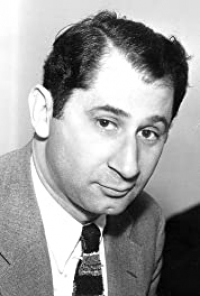
Lew Pollack (June 16, 1895 – January 18, 1946) was an American song composer and musician active during the 1920s and the 1930s.Pollack was born in New York City where he went to DeWitt Clinton High School and was active as a boy soprano in a choral group headed by Walter Damrosch.Starting out as a singer and pianist in vaudeville acts he began writing theme music for silent films before collaborating with others on popular songs. In 1914, he wrote "That's a Plenty", a rag that became an enduring Dixieland standard.
Tchaikovsky

Pyotr Il'yich Tchaikovsky (May 7 1840 â November 6 1893) was a Russian composer of the Romantic era. While not part of the nationalistic music group known as "The Five", Tchaikovsky wrote music which, in the opinion of Harold Schonberg, was distinctly Russian: plangent, introspective, with modally-inflected melody and harmony.
Aesthetically, Tchaikovsky remained open to all aspects of Saint Petersburg musical life. He was impressed by Serov and Balakirev as well as the classical values upheld by the conservatory. Both the progressive and conservative camps in Russian music at the time attempted to win him over. Tchaikovsky charted his compositional course between these two factions, retaining his individuality as a composer as well as his Russian identity. In this he was influenced by the ideals of his teacher Nikolai Rubinstein and Nikolai's brother Anton.
Tchaikovsky's musical cosmopolitanism led him to be favored by many Russian music-lovers over the "Russian" harmonies and styles of Mussorgsky, Borodin and Rimsky-Korsakov.
Nonetheless he frequently adapted Russian traditional melodies and dance forms in his music, which enhanced his success in his home country. The success in St. Petersburg at the premiere of his Third Orchestral Suite may have been due in large part to his concluding the work with a polonaise. He also used a polonaise for the final movement of his Third Symphony.
Aesthetically, Tchaikovsky remained open to all aspects of Saint Petersburg musical life. He was impressed by Serov and Balakirev as well as the classical values upheld by the conservatory. Both the progressive and conservative camps in Russian music at the time attempted to win him over. Tchaikovsky charted his compositional course between these two factions, retaining his individuality as a composer as well as his Russian identity. In this he was influenced by the ideals of his teacher Nikolai Rubinstein and Nikolai's brother Anton.
Tchaikovsky's musical cosmopolitanism led him to be favored by many Russian music-lovers over the "Russian" harmonies and styles of Mussorgsky, Borodin and Rimsky-Korsakov.
Nonetheless he frequently adapted Russian traditional melodies and dance forms in his music, which enhanced his success in his home country. The success in St. Petersburg at the premiere of his Third Orchestral Suite may have been due in large part to his concluding the work with a polonaise. He also used a polonaise for the final movement of his Third Symphony.
Avenue Q
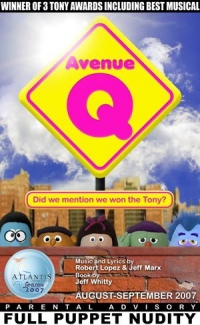
Avenue Q is a musical conceived by Robert Lopez and Jeff Marx, who wrote the music and lyrics, and directed by Jason Moore. The book is by Jeff Whitty. The show was produced by and opened at the Off-Broadway Vineyard Theatre in March 2003. The production transferred to Broadway in July 2003 and won several Tony Awards, including the award for Best Musical. It is still running on Broadway and holds the position of 26th longest running musical in Broadway history. The show has spawned a 2005 Las Vegas production, a 2006 West End production and various international productions. A U.S. national tour began in July 2007.
The show is largely inspired by (and is in the style of) Sesame Street: Most of the characters in the show are puppets (operated by actors onstage), the set depicts several tenements on a rundown street in an "outer borough" of New York City, both the live characters and puppet characters sing, and short animated video clips are played as part of the story. Also, several characters are recognizably parodies of classic Sesame Street characters: for example, the roommates Rod and Nicky are versions of Sesame Street's Bert and Ernie, and Trekkie Monster is based on Cookie Monster. However, the characters are in their twenties and thirties and face adult problems instead of those faced by pre-schoolers, thus making the show more suited for the adults who grew up with Sesame Street. The characters use profanity, and the songs concern adult themes (except the opening number). A recurring theme is the central character's search for a "purpose." Since the musical soundtrack for it was released, the song "The Internet is For Porn" has become particularly popular on websites such as YouTube and can be downloaded for free from the official website. According to the official site, the musical is appropriate for both adults and teenagers.
The show is largely inspired by (and is in the style of) Sesame Street: Most of the characters in the show are puppets (operated by actors onstage), the set depicts several tenements on a rundown street in an "outer borough" of New York City, both the live characters and puppet characters sing, and short animated video clips are played as part of the story. Also, several characters are recognizably parodies of classic Sesame Street characters: for example, the roommates Rod and Nicky are versions of Sesame Street's Bert and Ernie, and Trekkie Monster is based on Cookie Monster. However, the characters are in their twenties and thirties and face adult problems instead of those faced by pre-schoolers, thus making the show more suited for the adults who grew up with Sesame Street. The characters use profanity, and the songs concern adult themes (except the opening number). A recurring theme is the central character's search for a "purpose." Since the musical soundtrack for it was released, the song "The Internet is For Porn" has become particularly popular on websites such as YouTube and can be downloaded for free from the official website. According to the official site, the musical is appropriate for both adults and teenagers.
Adriano Celentano
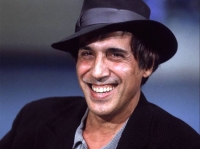
Adriano Celentano Singer Adriano Celentano, Italian singer, wrestler, comedian, actor and television presenter. Wikipedia
Date of birth: January 6, 1938 (81 years old), Greco, Milan, Italy Spouse: Claudia Mori (e. 1964) Children: Rosalinda Celentano, Giacomo Celentano, Rosita Celentano Albums: Soli, Mina Celentano, Io non so parlar d'amore,
Date of birth: January 6, 1938 (81 years old), Greco, Milan, Italy Spouse: Claudia Mori (e. 1964) Children: Rosalinda Celentano, Giacomo Celentano, Rosita Celentano Albums: Soli, Mina Celentano, Io non so parlar d'amore,
Antonin Dvorak

Antonín Leopold Dvořák (English pronunciation: /ˈdvɒrʒɑːk/ DVOR-zhahk or /ˈdvɒrʒæk/ DVOR-zhak; Czech: ( listen); September 8, 1841 – May 1, 1904) was a Czech composer of Romantic music, who employed the idioms of the folk music of Moravia and his native Bohemia. His works include operas, symphonic, choral and chamber music. His best-known works include his New World Symphony, the Slavonic Dances, "American" String Quartet, and Cello Concerto in B minor.
Dvořák wrote in a variety of forms: his nine symphonies generally stick to classical models that Beethoven would have recognised, but he also worked in the newly developed symphonic poem form and the influence of Richard Wagner is apparent in some works. Many of his works also show the influence of Czech folk music, both in terms of rhythms and melodic shapes; perhaps the best known examples are the two sets of Slavonic Dances. Dvořák also wrote operas (of which the best known is Rusalka); serenades for string orchestra and wind ensemble; chamber music (including a number of string quartets, and quintets); songs; choral music; and piano music.
Dvořák wrote in a variety of forms: his nine symphonies generally stick to classical models that Beethoven would have recognised, but he also worked in the newly developed symphonic poem form and the influence of Richard Wagner is apparent in some works. Many of his works also show the influence of Czech folk music, both in terms of rhythms and melodic shapes; perhaps the best known examples are the two sets of Slavonic Dances. Dvořák also wrote operas (of which the best known is Rusalka); serenades for string orchestra and wind ensemble; chamber music (including a number of string quartets, and quintets); songs; choral music; and piano music.
Wladyslaw Zelenski
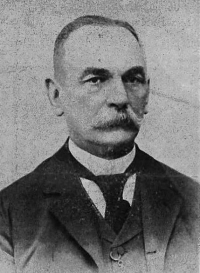
Władysław Marcjan Mikołaj Żeleński (6 July 1837 – 23 January 1921) was a Polish composer, pianist and organistŻeleński was born in Grodkowice. He was a representative of neoromanticism in Polish music. Since early days Żeleński showed interest in chamber music. While in secondary school, he wrote two quartets and a trio that, however, have not survived to our times. Later chamber pieces: Sextet in C major, Op. 9 and Wariacje na temat własny (Variations on an Original Theme) for string quartet, Op. 29 Żeleński composed while studying first in Prague and later in Paris. He died in Kraków.
The Be Sharps
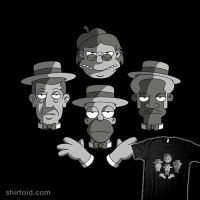
The Be Sharps were once a band consisting of Homer Simpson, Apu Nahasapeemapetilon, Seymour Skinner, and Chief Wiggum (later replaced by Barney Gumble because he was too "village people").
Nina Simone
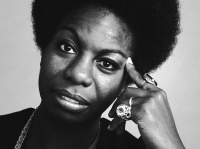
Nina Simone was an American singer, songwriter, pianist, arranger, and civil rights activist who worked in a broad range of musical styles including classical, jazz, blues, folk, R&B, gospel, and pop.
Alphaville

Alphaville is a German synth-pop band which gained popularity in the 1980s. The founding members were lead singer Marian Gold (real name: Hartwig Schierbaum, born 26 May 1954 in Herford), Bernhard Lloyd (real name: Bernhard Gössling, born 2 June 1960 in Enger), and Frank Mertens (real name: Frank Sorgatz, born 26 October 1961 in Enger). They achieved chart success with the singles "Forever Young", "Big in Japan", "Sounds Like a Melody", "The Jet Set" and "Dance with Me.
Footloose
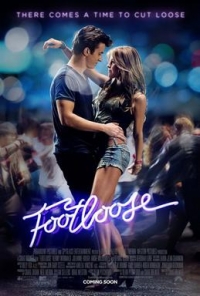
Footloose is a 2011 American musical film co-written and directed by Craig Brewer. It is a remake of the 1984 film of the same name and stars Kenny Wormald, Julianne Hough, Miles Teller, Andie MacDowell and Dennis Quaid. The film follows a young man who moves from Boston to a small southern town and protests the town's ban against dancing. Filming took place from September to November 2010 in Georgia. It was released in Australia and New Zealand on October 6, 2011, and in North America on October 14, 2011. It grossed $15.5 million in its opening weekend and $63 million worldwide from a $24 million budget.
Hillsong Worship

Hillsong Worship is an Australian Christian music praise & worship group from Sydney, Australia, where they started making music in 1983, at Hillsong Church. Twelve have charted on the Billboard magazine charts in the US
Angel Sanctuary
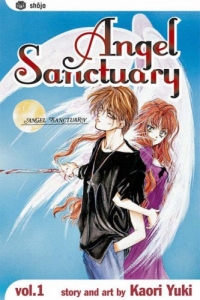
Angel Sanctuary is a Japanese manga series written and illustrated by Kaori Yuki. It was serialized in the shōjo manga magazine Hana to Yume from July 1994 to October 2000.
Max Gazzé
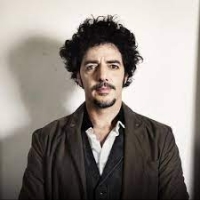
Max Gazzè (July 7, 1967 in Rome, Italy) is an Italian singer.
Max and his wife have three children, Samuele (1998), Bianca (2001) and Emily (2006). Max's songs are usually written by his brother, Francesco Gazzé.
Max and his wife have three children, Samuele (1998), Bianca (2001) and Emily (2006). Max's songs are usually written by his brother, Francesco Gazzé.
Chris Tomlin
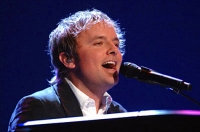
Christopher Dwayne Tomlin (born May 4, 1972) is a Christian worship leader and songwriter from Grand Saline, Texas, United States. He is a staff member at Austin Stone Community Church and is signed to EMI's sixstepsrecords. Tomlin also leads worship at many Passion events. Some of his most well-known songs are "How Great Is Our God", "Indescribable", "Forever", "Famous One", "We Fall Down", "Holy Is the Lord" and "Made to Worship".
According to the Christian Copyright Licensing International, Tomlin is the most sung Christian artist in the United States. He was awarded Male Vocalist at the 2006 and 2007 Gospel Music Awards, and was named Artist of the Year in 2007 and 2008. Chris Tomlin will be releasing his 7th studio album "Hello Love" which is due September 2nd 2008.
According to the Christian Copyright Licensing International, Tomlin is the most sung Christian artist in the United States. He was awarded Male Vocalist at the 2006 and 2007 Gospel Music Awards, and was named Artist of the Year in 2007 and 2008. Chris Tomlin will be releasing his 7th studio album "Hello Love" which is due September 2nd 2008.
Koji Kondo

Koji Kondo (近藤浩治 Kondō Kōji?, born August 13, 1960) is a Japanese video game composer and sound director who has been employed at Nintendo since 1984. He is best known for scoring numerous titles in the Mario and The Legend of Zelda series.
Nelson Rangell
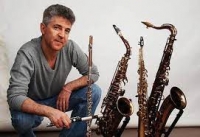
Nelson Rangell is an American smooth jazz musician and composer from Castle Rock, Colorado. Although he is known for his work with the tenor, alto, and soprano saxophone, his primary instrument is the piccolo, which he began playing at the age of 15. He has at times worked with Jimmy Haslip and Russ Ferrante.
Bach

Johann Sebastian Bach (31 March 1685 – 28 July 1750) was a German composer and organist whose sacred and secular works for choir, orchestra, and solo instruments drew together the strands of the Baroque period and brought it to its ultimate maturity. Although he introduced no new forms, he enriched the prevailing German style with a robust contrapuntal technique, an unrivalled control of harmonic and motivic organisation in composition for diverse musical forces, and the adaptation of rhythms and textures from abroad, particularly Italy and France.
Revered for their intellectual depth and technical and artistic beauty, Bach's works include the Brandenburg concertos; the Goldberg Variations; the English Suites, French Suites, Partitas, and Well-Tempered Clavier; the Mass in B Minor; the St. Matthew Passion; the St. John Passion; The Musical Offering; The Art of Fugue; the Sonatas and Partitas for violin solo; the Cello Suites; more than 200 surviving cantatas; and a similar number of organ works, including the celebrated Toccata and Fugue in D Minor.
While Bach's fame as an organist was great during his lifetime, he was not particularly well-known as a composer. His adherence to Baroque forms and contrapuntal style was considered "old-fashioned" by his contemporaries, especially late in his career when the musical fashion tended towards Rococo and later Classical styles. A revival of interest and performances of his music began early in the 19th century, and he is now widely considered to be one of the greatest composers in the Western tradition.
Revered for their intellectual depth and technical and artistic beauty, Bach's works include the Brandenburg concertos; the Goldberg Variations; the English Suites, French Suites, Partitas, and Well-Tempered Clavier; the Mass in B Minor; the St. Matthew Passion; the St. John Passion; The Musical Offering; The Art of Fugue; the Sonatas and Partitas for violin solo; the Cello Suites; more than 200 surviving cantatas; and a similar number of organ works, including the celebrated Toccata and Fugue in D Minor.
While Bach's fame as an organist was great during his lifetime, he was not particularly well-known as a composer. His adherence to Baroque forms and contrapuntal style was considered "old-fashioned" by his contemporaries, especially late in his career when the musical fashion tended towards Rococo and later Classical styles. A revival of interest and performances of his music began early in the 19th century, and he is now widely considered to be one of the greatest composers in the Western tradition.
Damien Rice
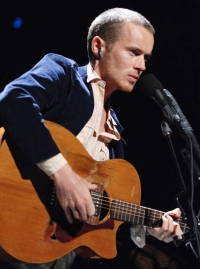
Damien Rice (born December 7, 1973) is an Irish folk singer. He was born in Dublin, Ireland, to George and Maureen Rice and was raised in Celbridge, County Kildare, Ireland. He is also a distant relative of the famous Dubliner Katharine Rice.
He has released five albums: O, B-Sides, 9, Live At Fingerprints Warts & All, and Live from the Union Chapel.
Thanks to David Arnold, his second cousin, Rice was able to record O, which was released in 2003. O was dedicated to fellow Irish musician Mic Christopher. The album was a strong commercial success and won the Shortlist Music Prize.
Three years later, following extensive promotion of O in Ireland and further commercial success worldwide, Rice released his second studio album 9 in 2006. The album was recorded in 2004 and 2005, and released on November 3 in Ireland, on November 6 in Europe and the rest of the world and lastly on November 14 in North America.
He has released five albums: O, B-Sides, 9, Live At Fingerprints Warts & All, and Live from the Union Chapel.
Thanks to David Arnold, his second cousin, Rice was able to record O, which was released in 2003. O was dedicated to fellow Irish musician Mic Christopher. The album was a strong commercial success and won the Shortlist Music Prize.
Three years later, following extensive promotion of O in Ireland and further commercial success worldwide, Rice released his second studio album 9 in 2006. The album was recorded in 2004 and 2005, and released on November 3 in Ireland, on November 6 in Europe and the rest of the world and lastly on November 14 in North America.
Chopin

Frédéric Chopin (1 March 1810 – 17 October 1849) was a Polish composer and virtuoso pianist of the Romantic period. He is widely regarded as the greatest Polish composer, and ranks as one of music's greatest tone poets.
He was born in the village of Żelazowa Wola, in the Duchy of Warsaw, to a Polish mother and French-expatriate father, and in his early life was regarded as a child-prodigy pianist. In November 1830, at the age of 20, Chopin went abroad; following the suppression of the Polish November Uprising of 1830–31, he became one of many expatriates of the Polish "Great Emigration."
In Paris, he made a comfortable living as a composer and piano teacher, while giving few public performances. A Polish patriot,
Chopin's extant compositions were written primarily for the piano as a solo instrument. Though technically demanding, Chopin's style emphasizes nuance and expressive depth rather than virtuosity. Chopin invented musical forms such as the ballade and was responsible for major innovations in forms such as the piano sonata, waltz, nocturne, étude, impromptu and prelude. His works are mainstays of Romanticism in 19th-century classical music.
He was born in the village of Żelazowa Wola, in the Duchy of Warsaw, to a Polish mother and French-expatriate father, and in his early life was regarded as a child-prodigy pianist. In November 1830, at the age of 20, Chopin went abroad; following the suppression of the Polish November Uprising of 1830–31, he became one of many expatriates of the Polish "Great Emigration."
In Paris, he made a comfortable living as a composer and piano teacher, while giving few public performances. A Polish patriot,
Chopin's extant compositions were written primarily for the piano as a solo instrument. Though technically demanding, Chopin's style emphasizes nuance and expressive depth rather than virtuosity. Chopin invented musical forms such as the ballade and was responsible for major innovations in forms such as the piano sonata, waltz, nocturne, étude, impromptu and prelude. His works are mainstays of Romanticism in 19th-century classical music.
Emily Haines

Emily Savitri Haines is a Canadian singer and songwriter. She is the lead singer, keyboardist and songwriter of the rock band Metric and a member of Broken Social Scene. As a solo artist, she has performed under her own name and under the moniker Emily Haines & The Soft Skeleton.
Sally DeFord

Sally DeFord Musical artist Born: 1959 (age 60 years), Eugene, Oregon, United States
Record labels: Defordmusic, Defordmusic.com, Sally DeFord Music, Sally DeFord
Genres: Alt Contemporary Christian, Christian/Gospel
Albums: He Is My Song, MORE
Record labels: Defordmusic, Defordmusic.com, Sally DeFord Music, Sally DeFord
Genres: Alt Contemporary Christian, Christian/Gospel
Albums: He Is My Song, MORE
Keith Jarrett

Keith Jarrett (born May 8, 1945 in Allentown, Pennsylvania) is an American pianist and composer.
His career started with Art Blakey, Charles Lloyd and Miles Davis. Since the early 1970s he has enjoyed a great deal of success in both classical music and jazz, as a group leader and a solo performer. His improvisation technique combines not only jazz, but also other forms of music, especially classical, gospel, blues and ethnic folk music.
In 2003 he received the Polar Music Prize, being the first (and to this day only) recipient not sharing the prize with anyone else.
His career started with Art Blakey, Charles Lloyd and Miles Davis. Since the early 1970s he has enjoyed a great deal of success in both classical music and jazz, as a group leader and a solo performer. His improvisation technique combines not only jazz, but also other forms of music, especially classical, gospel, blues and ethnic folk music.
In 2003 he received the Polar Music Prize, being the first (and to this day only) recipient not sharing the prize with anyone else.
Jule Styne
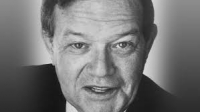
Jule Styne (/ˈdʒuːli staɪn/; December 31, 1905 – September 20, 1994) was a British-American song writer and composer known for a series of Broadway musicals, which include several famous and frequently revived shows.
Anton Karas
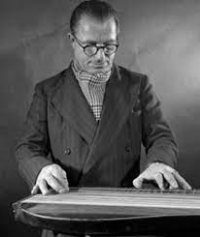
Anton Karl Karas was an Austrian zither player and composer, best known for his internationally famous 1948 soundtrack to Carol Reed's The Third Man. His association with the film came about as a result of a chance meeting with its director.
Igor Stravinsky

Igor Fyodorovich Stravinsky (17 June 1882 – 6 April 1971) was a Russian-born, naturalised French, later naturalised American composer, pianist, and conductor.
He is widely acknowledged as one of the most important and influential composers of 20th century music. He was a quintessentially cosmopolitan Russian who was named by Time magazine as one of the 100 most influential people of the century. He became a naturalised French citizen in 1934 and a naturalized US citizen in 1945. In addition to the recognition he received for his compositions, he also achieved fame as a pianist and a conductor, often at the premieres of his works.
Stravinsky's compositional career was notable for its stylistic diversity. He first achieved international fame with three ballets commissioned by the impresario Sergei Diaghilev and performed by Diaghilev's Ballets Russes (Russian Ballets): The Firebird (1910), Petrushka (1911/1947), and The Rite of Spring (1913). The Rite, whose premiere provoked a riot, transformed the way in which subsequent composers thought about rhythmic structure, and was largely responsible for Stravinsky's enduring reputation as a musical revolutionary, pushing the boundaries of musical design.
After this first Russian phase Stravinsky turned to neoclassicism in the 1920s. The works from this period tended to make use of traditional musical forms (concerto grosso, fugue, symphony), frequently concealed a vein of intense emotion beneath a surface appearance of detachment or austerity, and often paid tribute to the music of earlier masters, for example J.S. Bach and Tchaikovsky.
In the 1950s he adopted serial procedures, using the new techniques over his last twenty years. Stravinsky's compositions of this period share traits with examples of his earlier output: rhythmic energy, the construction of extended melodic ideas out of a few two- or three-note cells, and clarity of form, of instrumentation, and of utterance.
He also published a number of books throughout his career, almost always with the aid of a collaborator, sometimes uncredited. In his 1936 autobiography, Chronicles of My Life, written with the help of Walter Nouvel, Stravinsky included his well-known statement that "music is, by its very nature, essentially powerless to express anything at all." With Alexis Roland-Manuel and Pierre Souvtchinsky he wrote his 1939–40 Harvard University Charles Eliot Norton Lectures, which were delivered in French and later collected under the title Poétique musicale in 1942 (translated in 1947 as Poetics of Music). Several interviews in which the composer spoke to Robert Craft were published as Conversations with Igor Stravinsky. They collaborated on five further volumes over the following decade.
He is widely acknowledged as one of the most important and influential composers of 20th century music. He was a quintessentially cosmopolitan Russian who was named by Time magazine as one of the 100 most influential people of the century. He became a naturalised French citizen in 1934 and a naturalized US citizen in 1945. In addition to the recognition he received for his compositions, he also achieved fame as a pianist and a conductor, often at the premieres of his works.
Stravinsky's compositional career was notable for its stylistic diversity. He first achieved international fame with three ballets commissioned by the impresario Sergei Diaghilev and performed by Diaghilev's Ballets Russes (Russian Ballets): The Firebird (1910), Petrushka (1911/1947), and The Rite of Spring (1913). The Rite, whose premiere provoked a riot, transformed the way in which subsequent composers thought about rhythmic structure, and was largely responsible for Stravinsky's enduring reputation as a musical revolutionary, pushing the boundaries of musical design.
After this first Russian phase Stravinsky turned to neoclassicism in the 1920s. The works from this period tended to make use of traditional musical forms (concerto grosso, fugue, symphony), frequently concealed a vein of intense emotion beneath a surface appearance of detachment or austerity, and often paid tribute to the music of earlier masters, for example J.S. Bach and Tchaikovsky.
In the 1950s he adopted serial procedures, using the new techniques over his last twenty years. Stravinsky's compositions of this period share traits with examples of his earlier output: rhythmic energy, the construction of extended melodic ideas out of a few two- or three-note cells, and clarity of form, of instrumentation, and of utterance.
He also published a number of books throughout his career, almost always with the aid of a collaborator, sometimes uncredited. In his 1936 autobiography, Chronicles of My Life, written with the help of Walter Nouvel, Stravinsky included his well-known statement that "music is, by its very nature, essentially powerless to express anything at all." With Alexis Roland-Manuel and Pierre Souvtchinsky he wrote his 1939–40 Harvard University Charles Eliot Norton Lectures, which were delivered in French and later collected under the title Poétique musicale in 1942 (translated in 1947 as Poetics of Music). Several interviews in which the composer spoke to Robert Craft were published as Conversations with Igor Stravinsky. They collaborated on five further volumes over the following decade.
Lyle Mays
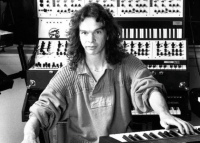
Lyle David Mays was an American jazz pianist, composer, and member of the Pat Metheny Group. Metheny and Mays composed and arranged nearly all of the group's music, for which Mays won eleven Grammy Awards.
Richard Jones

Richard Jones is a British music producer, songwriter, bass guitar player and founding member of the British rock band The Feeling.Jones attended the BRIT School in Croydon. He cites Paul McCartney and John Deacon among his influences. He also admires Jaco Pastorius and James Jamerson for their "technicality".
TVXQ

TVXQ, an initialism for Tong Vfang Xien Qi, is a South Korean male pop duo consisting of U-Know Yunho and Max Changmin. They are known as Tohoshinki in Japanese releases, and are sometimes referred to as DBSK, an abbreviation of their Korean name Dong Bang Shin Ki.
Alejandro Mejia
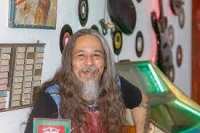
Alejandro Mejía Musical artist Genre: Seasonal Songs Cordero de Dios Como El Ciervo · 2014 Cántico De María Como El Ciervo · 2014 Gloria Como El Ciervo · 2014
Dovid Gabay

Gabay began his musical career at age nineteen, singing at simchos. Since then Gabay has become one of Jewish music's fastest rising stars, ...
Slavko Avsenik
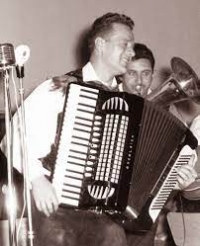
Slavko Avsenik was a Slovene composer and musician. Beginning in 1953 with the formation of the Avsenik Brothers Ensemble, Avsenik produced more than 1,000 songs and garnered success both in Slovenia and in other parts of Europe and America, and is viewed as a Slovenian cultural icon.
Bill Stewart
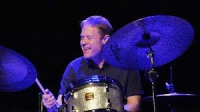
William Harris Stewart is an American jazz drummer. He has performed with Maceo Parker, John Scofield, Joe Lovano, Michael Brecker, Pat Metheny, Lonnie Smith, Nicholas Payton, Bill Carrothers, Steve Wilson, Seamus Blake, Larry Goldings and Peter Bernstein, and Jim Hall.
Chris Cheek
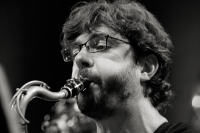
Cheek was born in St. Louis, Missouri, where his father was the director of a Junior high school band. Cheek began learning to play the alto saxophone at age eleven, and upon graduation from high school, he attended Webster University. He studied at the Berklee College of Music under Joe Viola, Hal Crook, and Herb Pomeroy, and earned his bachelor's degree. He moved to New York City in 1992, where he played with Paul Motian in the Electric Bebop Band, and co-founded Bloomdaddies with Seamus Blake. He also played with Guillermo Klein, Mika Pohjola, Luciana Souza, and David Berkman.
Marc-André Hamelin
Marc-André Hamelin, OC, CQ (born September 5, 1961), is a Canadian virtuoso pianist and composer. Hamelin is recognized worldwide for the originality and technical proficiency of his performances of the classic repertoire. He has received 11 Grammy Award nominations.
Aldo Tagliapietra
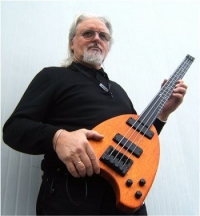
Aldo Tagliapietra (born February 20, 1945) is an Italian singer, songwriter and musician best known for his work with the progressive rock band Le Orme.Aldo Tagliapietra was born in Murano on February 20, 1945. The son of a master glassmaker, he graduated in theory and solfeggio at the Conservatory of Padua. He formed his first band in 1962 (The Corals) and in 1966 formed Le Orme. Le Orme went on to become one of the most widely recognised Italian progressive rock acts, and were active until 1982 when the group went on hiatus.In 1984 Tagliapietra released his first solo album ...nella notte. Le Orme reformed in 1986, releasing four albums over the next 23 years. In 1994 Tagliapietra travelled to India where he began to study sitar under Budhaditya Mukherje. The sitar was to feature on the Le Orme albums Il Fiume and L'Infinito as well as his 2008 solo album Il Viaggio.
Victor Herbert
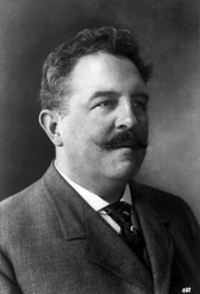
Victor August Herbert (February 1, 1859 – May 26, 1924) was an Irish-born, German-raised American composer, cellist and conductor. Although Herbert enjoyed important careers as a cello soloist and conductor, he is best known for composing many successful operettas that premiered on Broadway from the 1890s to World War I. He was also prominent among the tin pan alley composers and was later a founder of the American Society of Composers, Authors, and Publishers (ASCAP). A prolific composer, Herbert produced two operas, a cantata, 43 operettas, incidental music to 10 plays, 31 compositions for orchestra, nine band compositions, nine cello compositions, five violin compositions with piano or orchestra, 22 piano compositions and numerous songs, choral compositions and orchestrations of works by other composers, among other music.
In the early 1880s, Herbert began a career as a cellist in Vienna, Austria, and Stuttgart, Germany, during which he began to compose orchestral music. Herbert and his opera singer wife, Therese Förster, moved to the U.S. in 1886 when both were engaged by the Metropolitan Opera. In the U.S., Herbert continued his performing career, while also teaching at the National Conservatory of Music, conducting and composing. His most notable instrumental compositions were his Cello Concerto No. 2 in E minor, Op. 30 (1894), which entered the standard repertoire, and his Auditorium Festival March (1901). He led the Pittsburgh Symphony from 1898 to 1904 and then founded the Victor Herbert Orchestra, which he conducted throughout the rest of his life.
Herbert began to compose operettas in 1894, producing several successes, including The Serenade (1897) and The Fortune Teller (1898). Even more successful were some of the operettas that he wrote after the turn of the 20th century: Babes in Toyland (1903), Mlle. Modiste (1905), The Red Mill (1906), Naughty Marietta (1910), Sweethearts (1913) and Eileen (1917). After World War I, with the change of popular musical tastes, Herbert began to compose musicals and contributed music to other composers' shows. While some of these were well-received, he never again achieved the level of success that he had enjoyed with his most popular operettas.
In the early 1880s, Herbert began a career as a cellist in Vienna, Austria, and Stuttgart, Germany, during which he began to compose orchestral music. Herbert and his opera singer wife, Therese Förster, moved to the U.S. in 1886 when both were engaged by the Metropolitan Opera. In the U.S., Herbert continued his performing career, while also teaching at the National Conservatory of Music, conducting and composing. His most notable instrumental compositions were his Cello Concerto No. 2 in E minor, Op. 30 (1894), which entered the standard repertoire, and his Auditorium Festival March (1901). He led the Pittsburgh Symphony from 1898 to 1904 and then founded the Victor Herbert Orchestra, which he conducted throughout the rest of his life.
Herbert began to compose operettas in 1894, producing several successes, including The Serenade (1897) and The Fortune Teller (1898). Even more successful were some of the operettas that he wrote after the turn of the 20th century: Babes in Toyland (1903), Mlle. Modiste (1905), The Red Mill (1906), Naughty Marietta (1910), Sweethearts (1913) and Eileen (1917). After World War I, with the change of popular musical tastes, Herbert began to compose musicals and contributed music to other composers' shows. While some of these were well-received, he never again achieved the level of success that he had enjoyed with his most popular operettas.
Bee Gees
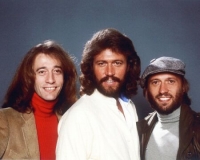
The Bee Gees were a singing trio of brothers — Barry, Robin, and Maurice Gibb. They were born on the Isle of Man to English parents, lived in Chorlton, Manchester, England and during their childhood years moved to Brisbane, Australia, where they began their musical careers. Their worldwide success came when they returned to England and signed with producer Robert Stigwood.
The multiple award-winning group was successful for most of its forty years of recording music, but it had two distinct periods of exceptional success: as a harmonic "soft rock" act in the late 1960s and early 1970s, and as the foremost stars of the disco music era in the late 1970s.
No matter the style, the Bee Gees sang three-part tight harmonies that were instantly recognizable; as brothers, their voices blended perfectly, in the same way that The Everly Brothers and Beach Boys did. Barry sang lead on many songs, and an R&B falsetto introduced in the disco years; Robin provided the clear vibrato lead that was a hallmark of their pre-disco music; Maurice sang high and low harmonies throughout their career. The three brothers co-wrote most of their hits, and they said that they felt like they became 'one person' when they were writing. The group's name was retired after Maurice died in January 2003.
The Bee Gees were inducted into The Rock and Roll Hall of Fame in 1997; fittingly, the presenter of the award to "Britain's first family of harmony" was Brian Wilson, leader of the Beach Boys, America's first family of rock harmony.
It has been estimated that the Bee Gees' record sales total more than 220 million, easily making them one of the best-selling music artists of all-time. The above figure in record sales does not include record sales for artists for whom they have written and with whom they have collaborated. Their 1997 Rock and Roll Hall of Fame citation says "Only Elvis Presley, The Beatles, Michael Jackson, Garth Brooks and Paul McCartney have outsold the Bee Gees".
The multiple award-winning group was successful for most of its forty years of recording music, but it had two distinct periods of exceptional success: as a harmonic "soft rock" act in the late 1960s and early 1970s, and as the foremost stars of the disco music era in the late 1970s.
No matter the style, the Bee Gees sang three-part tight harmonies that were instantly recognizable; as brothers, their voices blended perfectly, in the same way that The Everly Brothers and Beach Boys did. Barry sang lead on many songs, and an R&B falsetto introduced in the disco years; Robin provided the clear vibrato lead that was a hallmark of their pre-disco music; Maurice sang high and low harmonies throughout their career. The three brothers co-wrote most of their hits, and they said that they felt like they became 'one person' when they were writing. The group's name was retired after Maurice died in January 2003.
The Bee Gees were inducted into The Rock and Roll Hall of Fame in 1997; fittingly, the presenter of the award to "Britain's first family of harmony" was Brian Wilson, leader of the Beach Boys, America's first family of rock harmony.
It has been estimated that the Bee Gees' record sales total more than 220 million, easily making them one of the best-selling music artists of all-time. The above figure in record sales does not include record sales for artists for whom they have written and with whom they have collaborated. Their 1997 Rock and Roll Hall of Fame citation says "Only Elvis Presley, The Beatles, Michael Jackson, Garth Brooks and Paul McCartney have outsold the Bee Gees".
Carrie Underwood
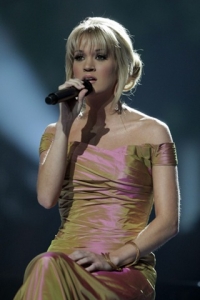
Carrie Marie Underwood (born March 10, 1983 in Muskogee, Oklahoma) is an American country singer-songwriter. She rose to fame as the winner of the fourth season of American Idol, and has become a multi-platinum selling recording artist and a multiple Grammy Award winner. Her debut album, Some Hearts, was certified seven times platinum and is the fastest selling debut country album in Nielsen SoundScan history.
Her second album, Carnival Ride, was released on October 23, 2007. It has so far sold about 2 million copies To date, Underwood has sold over 11 million records in the United States. Underwood was inducted as a member of the Grand Ole Opry on May 10, 2008.
Her second album, Carnival Ride, was released on October 23, 2007. It has so far sold about 2 million copies To date, Underwood has sold over 11 million records in the United States. Underwood was inducted as a member of the Grand Ole Opry on May 10, 2008.
Antonio Carlos Jobim

Antonio Carlos Brasileiro de Almeida Jobim (January 25, 1927 in Rio de Janeiro – December 8, 1994 in New York City), also known as Tom Jobim, was a Grammy Award-winning Brazilian songwriter, composer, arranger, singer, and pianist/guitarist. A primary force behind the creation of the bossa nova style, Jobim is acknowledged as one of the most influential popular composers of the 20th century. His songs have been performed by many singers and instrumentalists within Brazil and internationally.
 Sheet Music Exchange is a web site for those who wants to access popular sheet music easily,
letting them download the sheet music for free for trial purposes.
It's completely free to download and try the listed sheet music, but you have to delete the files after 24 hours of trial period.
Don't forget, if you like the piece of music you have just learned playing,
treat the artist with respect, and go buy the original sheet music.
Sheet Music Exchange is a web site for those who wants to access popular sheet music easily,
letting them download the sheet music for free for trial purposes.
It's completely free to download and try the listed sheet music, but you have to delete the files after 24 hours of trial period.
Don't forget, if you like the piece of music you have just learned playing,
treat the artist with respect, and go buy the original sheet music.